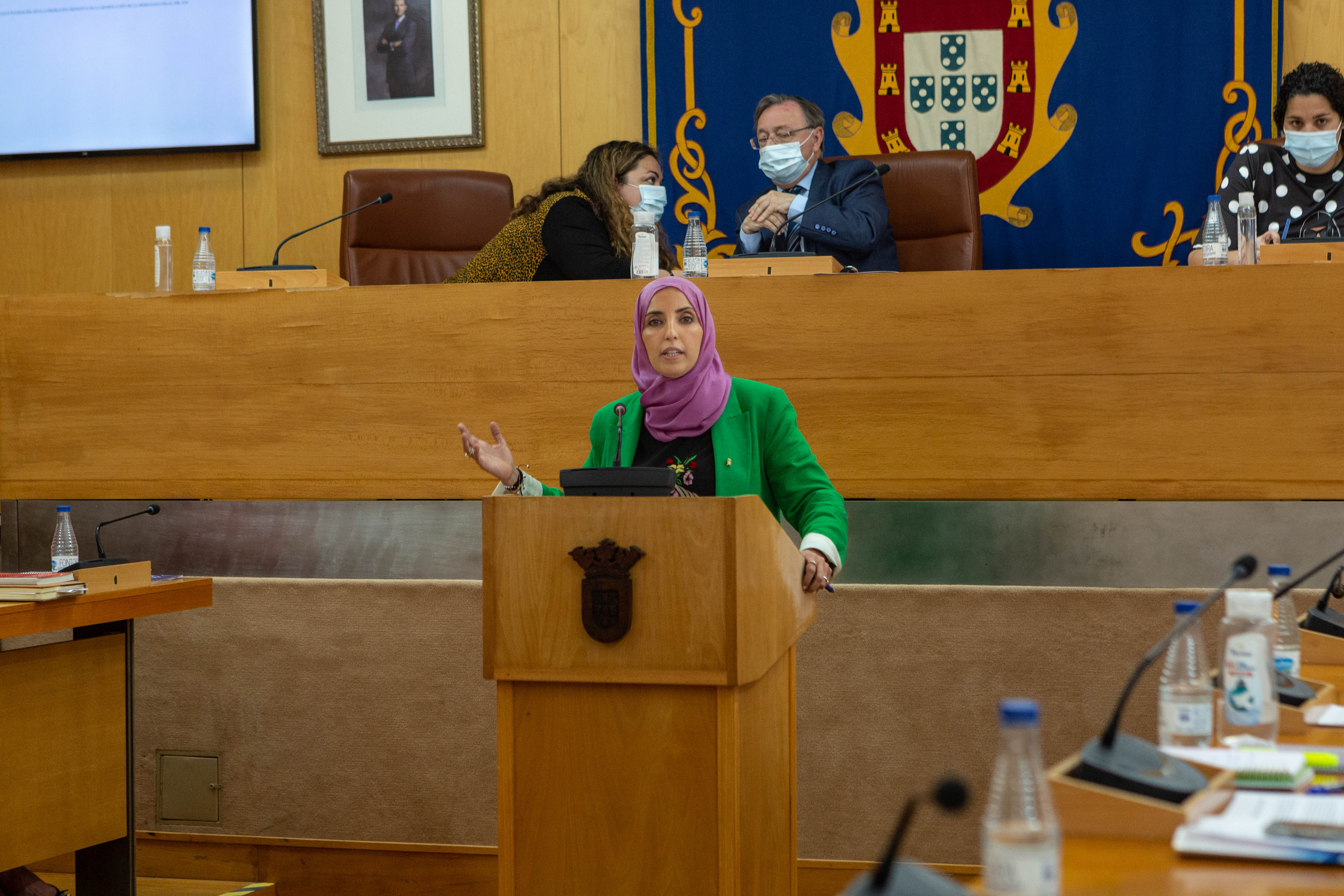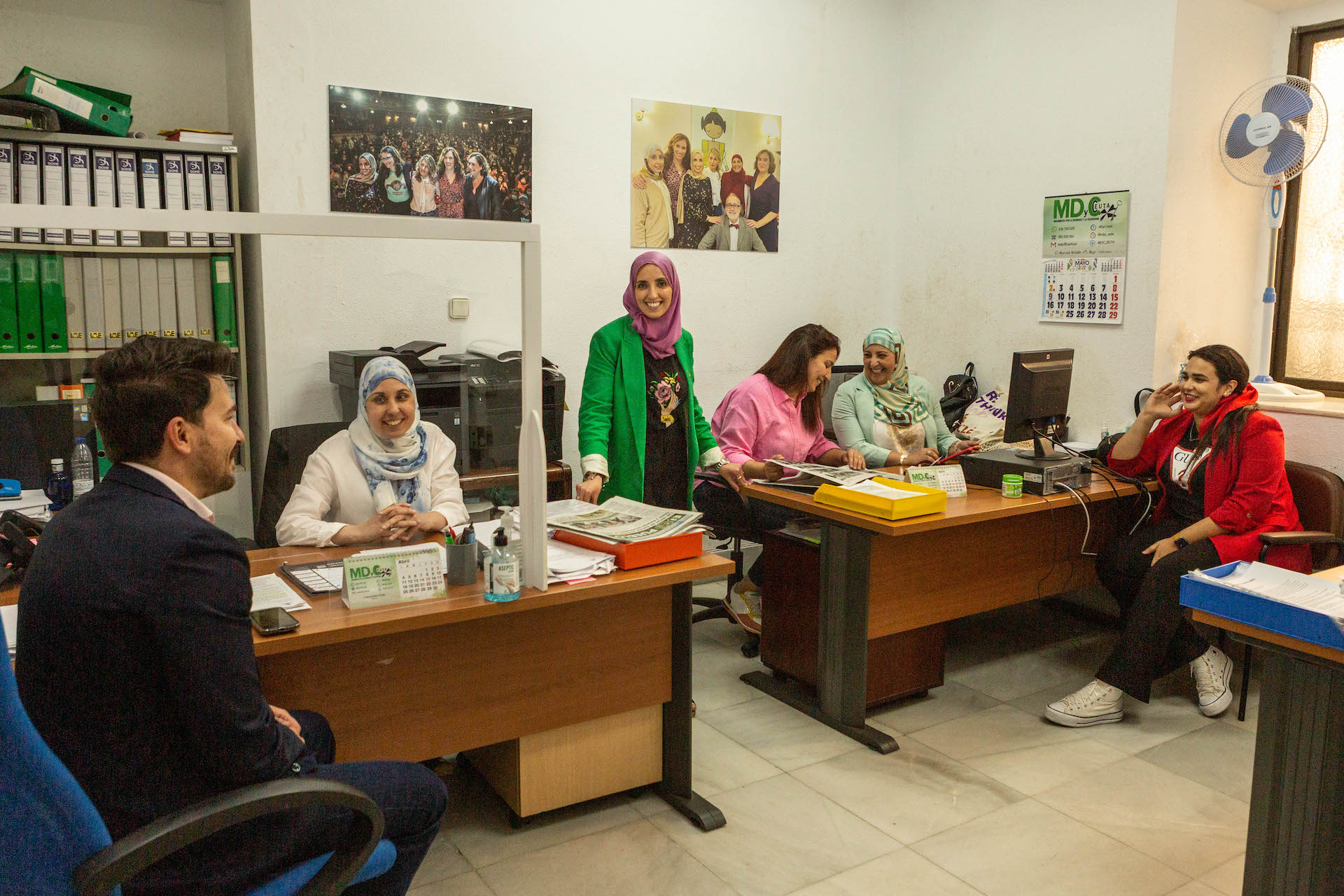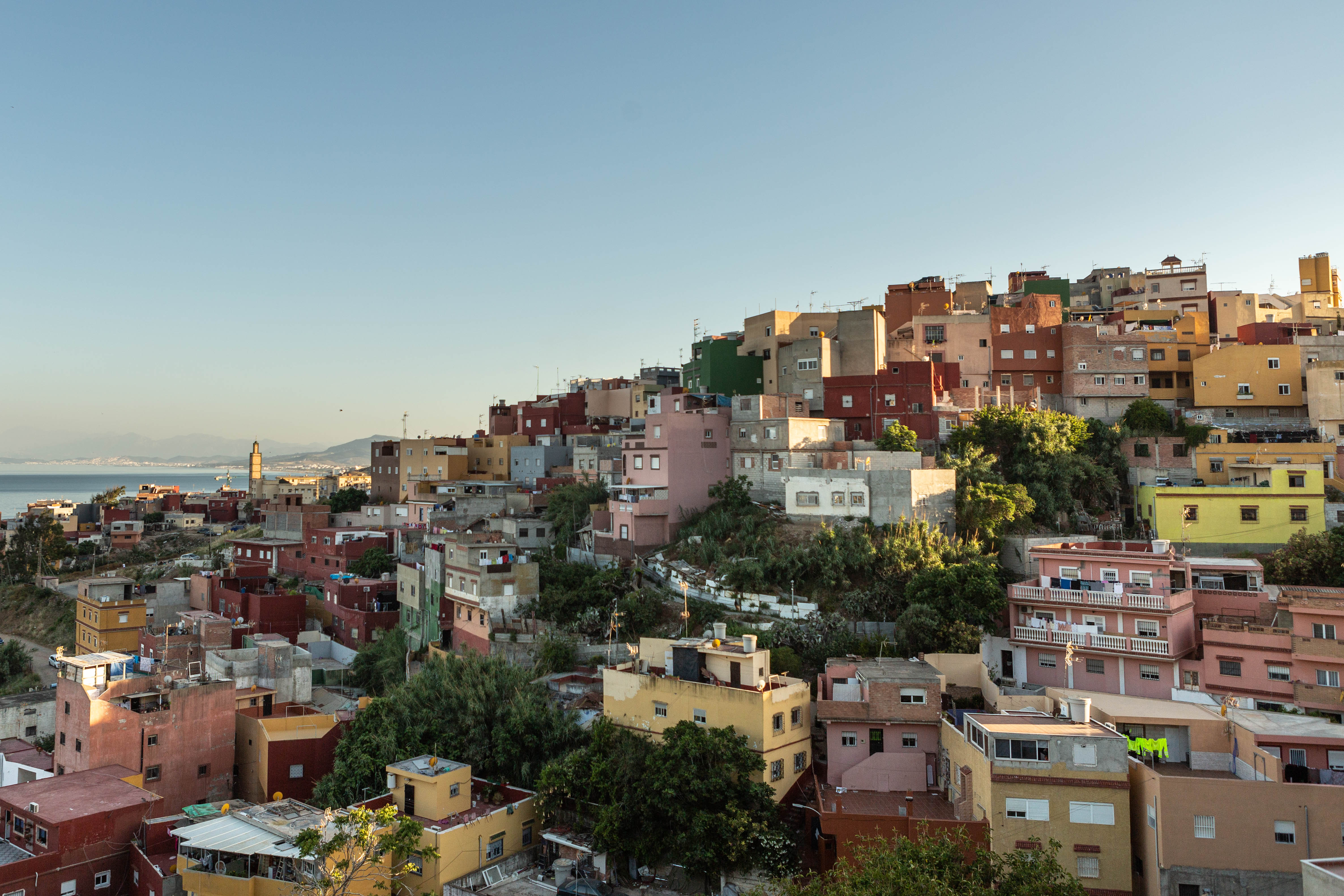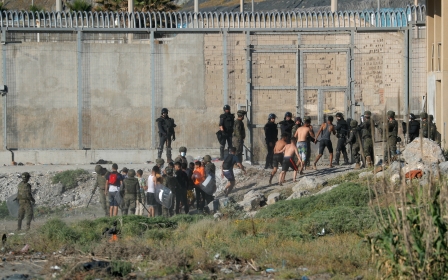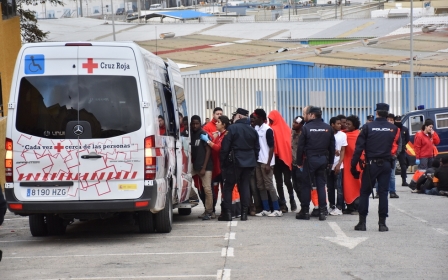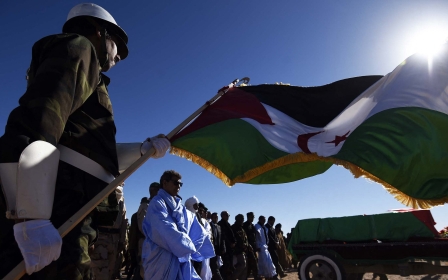The Muslim woman fighting Islamophobia in Spain's African enclave
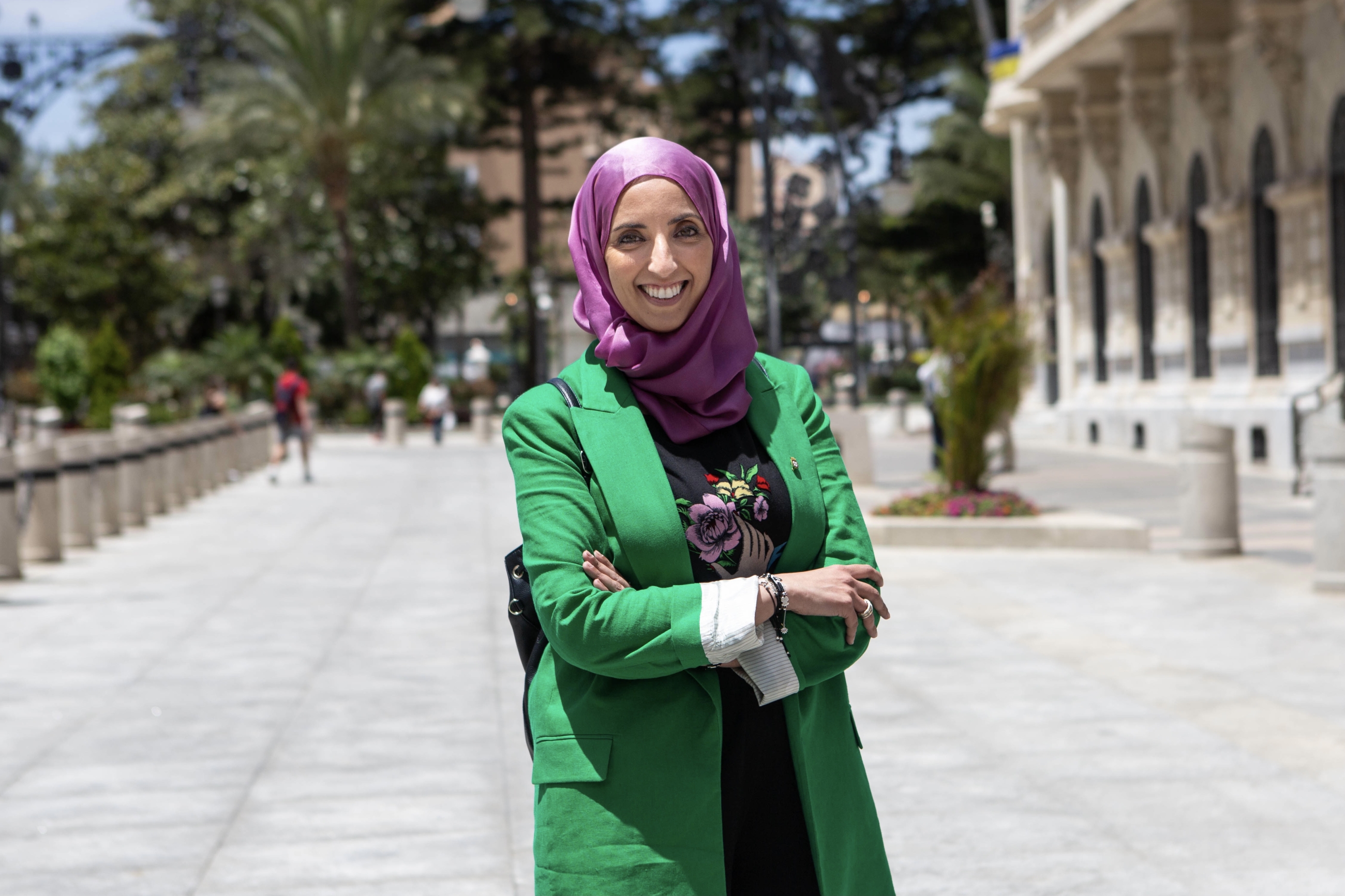
On the main street of Ceuta, the autonomous Spanish enclave of 85,000 people in North Africa bordering Morocco, Fatima Hamed Hossain greets everyone who crosses her path with a smile and a hello in Spanish and Darija, the Moroccan-Arabic dialect.
Charismatic, self-made and from humble beginnings, Hossain's outspokenness against a rising far right has turned her into a national symbol for the fight against hate speech.
Having first entered the Ceuta political scene in 2007 as part of the Caballas Coalition, a left-wing regionalist organisation, Hossain later left to form her own party, the Movement for Dignity and Citizenship in Ceuta (MDyC).
Among the many occasions when Hossain has stood up to the far right, one of the most memorable came during a plenary session in the summer of 2020 in response to the far-right Vox party and its hardline stance against Islam in a city that is 43 percent Muslim.
'You can't measure how Spanish I am by my surname or how I dress. You cannot say that Muslims, Jews or Hindus do not belong to this society'
- Fatima Hamed Hossain, politician
"You can't measure how Spanish I am by my surname or how I dress," she said in her speech. "You cannot say that Muslims, Jews or Hindus do not belong to this society."
New MEE newsletter: Jerusalem Dispatch
Sign up to get the latest insights and analysis on Israel-Palestine, alongside Turkey Unpacked and other MEE newsletters
Hossain was born in 1978 in Los Rosales, one of the poorest suburbs of Ceuta, along with Hadu and El Principe, according to the Spanish Institute of Statistics (INE). As an only child of Moroccan parents, Hossain says that politics were never discussed at home; she just remembers seeing her father working all hours, loading trucks, in order to provide for the family.
"I never heard anyone talking about politics. I guess as an immigrant family, the only focus was on getting ahead," Hossain tells Middle East Eye while drinking Moorish tea in the main street of Ceuta.
"I got involved in politics because many of us have grown up in forgotten and abandoned areas," she adds, referring to the striking inequalities in Ceuta, where 40 percent of the population live at risk of poverty and social exclusion. "That makes you aware that there are citizens who, although they are equal in law, are not equal in rights."
Hossain's family was able to pay for her college through scholarships, and today she is a lawyer specialising in human rights and gender equality, a profession she balances with her duties as a political representative.
Insult to Ceuta's Muslims
In the 2015 regional elections, Hossain's MDyC won three seats in a parliament of 25, and she became the first and only Muslim woman to lead an elected political party in Spain.
The eruption of the far-right Vox party in 2019 as a major political force affected the order and stability of Ceuta. MDyC lost one seat and the conservative People's Party, which has held a majority since 2001, also lost seats to the far right.
Anti-immigrant and anti-Islam, the far-right, in parliament and on social media, tries to discredit Hossain by calling her" jihad," "sharia" or "pro-Moroccan". She says that these insults aim to portray Ceuta's Muslim population as being foreigners in their own country, linking them with illegal immigration. Carlos Verdejo, an MP and Vox's spokesman in Ceuta, once tweeted a threat to deport Hossain "back to Morocco".
"We cannot remain silent before those who come to spread hatred and insults," she says. "They have not only been disrespectful towards us, but towards the entire city. We believe in democracy, and their lies must be dismantled with facts and dialogue."
Other examples of hateful rhetoric include the conversations leaked to the press in January 2020. In WhatsApp and audio messages, the leaders of Vox in Ceuta asked for "a third world war against Islam" and compared Ceuta with Palestine by claiming that the Muslim population was "invading and occupying" the city.
Rise of the far right in Ceuta
Born amid domestic tensions generated by Catalan separatism and an increase in the number of immigrants arriving on Spanish shores from Africa in 2018, Santiago Abascal's Vox party won its first parliamentary seats (24) in the general election of April 2019. In the November general elections that same year, Vox became the country's third political force when it secured 3.6 million votes and 52 seats in the congress of deputies.
In Ceuta, Vox also entered the political scene in 2019, deploying more hostile rhetoric than in other parts of the country, due to the city's ethnic composition and economic situation.
Ceuta has historically welcomed all beliefs and has always taken pride in the harmony and coexistence between four religions
With a population of 85,000, Ceuta has historically welcomed all beliefs and traditions due to its strategic position by the Strait of Gibraltar.
The city has always taken pride in the harmony and coexistence between four religions: there is a Hindu temple and a synagogue, the Islamic celebration Eid al-Adha is a public holiday and Catholic processions are celebrated every Easter.
But behind the cultural and religious mix hides an unequal reality. Beyond the clean and prosperous centre, the crowded Muslim-majority suburbs have Spain's highest rates of unemployment (up to 30 percent, according to the INE).
"We calculate that between 75 percent and 80 percent of the unemployed are Muslims," says Adbelkamil Mohamed, in charge of the neighbourhood association in El Principe, the most depressed quarter in Ceuta, with an average income among the lowest in Spain.
Mohamed thinks "the damage is institutional," since the conservative and Christian-democratic People's Party had been ruling Ceuta for the past two decades (until it lost in the April 2019 elections) "without focusing on improving education or employment here".
The feeling of institutional abandonment that many people have in Ceuta also applies to the central parliament in Madrid, adds Emilio Postigo, general secretary of the Ceuta branch of Comisiones Obreras, Spain's biggest trade union.
"Lack of projects and investment leave our economy at the expense of Morocco," says Postigo. Around €700m ($735m) a year, more than a quarter of the city's gross domestic product, comes from the illegal trade of goods with Morocco, according to local estimates.
In this fertile breeding ground, the far right win votes by making promises to build a bigger wall along the Moroccan border, deport illegal immigrants or defend "the Spanish identity of the territory" from "Islamisation".
Hossain's growth and national support
Hossain's voice and public interventions standing up for Ceuta's diversity and claiming her own "Spanish and Muslim" identity have earned her national recognition and support.
Proof of that growth, from local to national politics, was reinforced when she took part in an event last November in Valencia, alongside some of the most progressive female politicians in Spain.
The meeting was held to discuss feminist issues and to share common perspectives, but the reason why it grabbed wide media attention was because of the attendance of the minister of labour and social economy, Yolanda Diaz. Diaz is one of the most popular figures in the leftist Spanish government, currently preparing a platform to run for the 2023 general elections.
"We are proud and happy to be recognised and to see ourselves alongside this amazing woman," says Hossain, when asked about the possibility of her entering national politics. "But our focus is in Ceuta, and in the problems we have here."
'I love Fatima'
These days in the streets of Ceuta, Hossain is well known, and her reputation for standing up to the far right is well established.
"Fatima is highly qualified, her team always responds to our calls, and she speaks her mind against those who want to divide us," says Piedad, 40, a Christian who works as a cleaner and lives in the Hadu neighbourhood, an MDyC stronghold.
In El Principe, sisters Sara, 25, and Ahlem, 27, are also enthusiastic about Hossain.
"I love Fatima. I love what she says and how she says it, everything. She gives everything in each plenary session and stands up to Vox," says Sara.
'I love what she says and how she says it, everything. She gives everything in each plenary and stands up to Vox'
- Sara, El Principe resident
"Big traditional parties have failed here [in Ceuta], because they haven't been able to understand the idiosyncrasies and character of this region," says an unemployed Muslim man at a market in Hadu.
Not everyone has good words for the MDyC leader, however. Rahma Mokhlis, 45, is the representative of the neighbourhood association in Benzu, a small suburb in the north of Ceuta with barely any functioning public services. She acknowledges that Hossain is "a fighting woman who stirs consciences" and serves as an example for many women. However, she criticises her "individualism".
"At a national level she portrays an image, but at the local level she shows a different face," Mokhlis says. "She does not reach agreements, she does not sit down with the rest of the parties to confront the right part of the regional parliament."
For the moment, Hossain avoids talking about next year's elections.
"There is a lot of work to do every day, and I only hope that citizens take good note of each other's contributions," she says. "Ceuta is and will always be an intercultural and diverse city, even for those who want a society based on hate and fear."
This article is available in French on Middle East Eye French edition.
Middle East Eye delivers independent and unrivalled coverage and analysis of the Middle East, North Africa and beyond. To learn more about republishing this content and the associated fees, please fill out this form. More about MEE can be found here.


